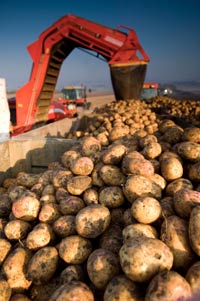Elm Farm 2010: Blight-resistant spuds could lower carbon levels

Using blight-resistant varieties of potato could reduce the carbon dioxide footprint from the sector by as much as 40%, research director David Shaw of Wales Sarvari Research Trust told delegates at the Elm Farm Organic Producer conference.
With 6mt of potatoes produced in Britain annually and widespread concern over blight disease, use of chemical controls had spiralled, he added. New potato varieties showing resistance to the disease had emerged helping cut chemical use but uptake and seed supply still remained issues.
“The problem for organic growers is modern potato varieties are bred for use in systems in conjunction with chemicals. Copper-based controls (for blight) are just not an option for organic growers and resistant varieties are the way forward.”
Blight resistance scoring might indicate suitable varieties but these should be monitored as the disease evolves, he added. “Varieties such as Axona have retained resistance,” he explained.
Others such as Toluca from Bioselect UK could be considered. It required highly fertile soil and good moisture levels but was reported to have good taste test and storage results, delegates heard.
Another variety Sarpo Shona – a white, general purpose, early main-crop potato with good blight resistance – could be considered, but access to seed was limited, he added.
